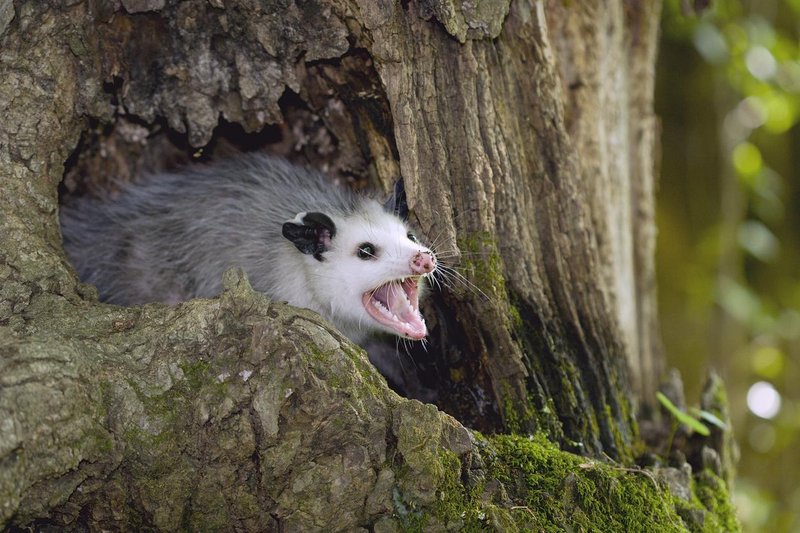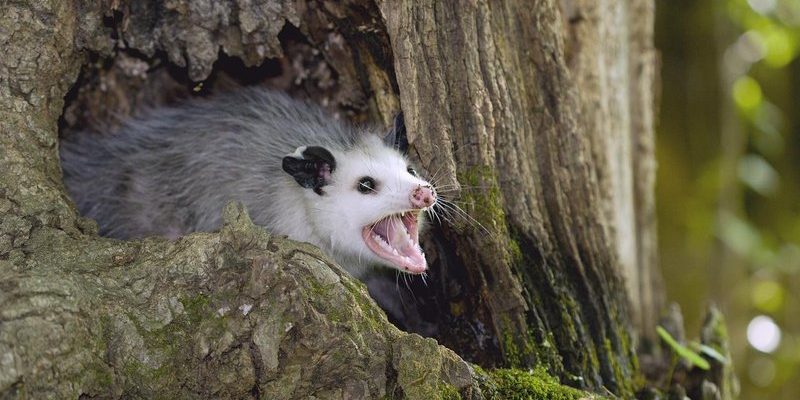
Let’s break it down. Picture a possum as a tiny, furry entertainer. They’re best known for their ability to ‘play dead’ when scared, a bizarre but effective trick. But can these small marsupials actually be dangerous to humans? The answer involves diving into their behavior, habitat, and the myths swirling around them.
Understanding Possum Behavior
Possums, or *Didelphis virginiana* for the science buffs, are usually shy and non-aggressive. They prefer to avoid confrontation, often using their famous “playing dead” tactic when threatened. This isn’t just a dramatic flair; it’s a survival strategy. By acting lifeless, they can trick predators into losing interest. You might think of it like putting on a bad act to get out of a sticky situation.
When they feel cornered, possums may hiss, growl, or show their teeth. However, they rarely escalate to biting unless absolutely necessary. Most of the time, possums are more interested in rummaging through your garbage than causing trouble. So when you see one, it’s usually just looking for a midnight snack, not plotting an attack.
In many cases, possums are quite beneficial. They’re nature’s cleanup crew, munching on pests like ticks, cockroaches, and even small rodents. In fact, they can eat up to 5,000 ticks in a single season! Pretty cool, right? So instead of viewing them as a threat, consider them more like furry little helpers in your neighborhood.
Do Possums Carry Diseases?
It’s true that possums can carry diseases, but it’s important to put this in perspective. They are known carriers of parasites like fleas and ticks, which can transmit diseases to pets and humans. The good news? Possums have a strong immune system that actually protects them from many diseases, including rabies. That’s right—because of their low body temperature, they’re not very likely to be infected with this deadly virus.
Still, it’s smart to be cautious. Avoid direct contact with possums and don’t try to handle them unless absolutely necessary. If you’re worried about potential parasites, make sure to keep your pets up to date on their vaccinations. Think of it like brushing your teeth regularly to prevent cavities—simple prevention goes a long way!
If you happen to find a sick or injured possum, it’s best to contact a wildlife rehabilitation center. They can handle these situations safely and humanely, ensuring the animal gets the care it needs.
Possums and Pets: What You Need to Know
If you have pets, you might wonder how possums interact with them. Generally, possums are not a significant threat to domestic animals. In fact, most pets, like dogs and cats, will give them a wide berth. However, there could be some situations where things get tricky.
For example, if a possum feels threatened, it might hiss, which could startle dogs that are naturally curious. But most of the time, they’ll just scurry away, avoiding any altercation. It’s like an awkward dance—each tries to avoid stepping on the other’s toes.
However, it’s still crucial to supervise your pets when they’re outside, especially at night. If you see a possum in your yard, it’s best to keep your furry friends indoors until the coast is clear. After all, prevention is better than cure, right?
How to Coexist with Possums
If you live in an area where possums are common, coexisting with them can be pretty straightforward. Here are some helpful tips:
- Secure Trash Cans: Make sure to keep your garbage tightly sealed. Possums love scavenging for food, so creating barriers helps minimize their visits.
- Remove Pet Food: Don’t leave pet food outside overnight; it can attract not just possums, but other wildlife too.
- Seal Entrances: Check your home’s foundation and roof for any openings where possums might sneak in. Closing these gaps can prevent unwanted guests.
- Enjoy from a Distance: If you see a possum in your yard, admire it from afar. They’re fascinating creatures, and it’s delightful to watch them go about their business.
Coexisting with possums is like living with any other wildlife—respect their space, and they’ll likely return the favor.
Common Misconceptions About Possums
Possums have a reputation that’s often exaggerated. One common myth is that they are aggressive or carry rabies, as we discussed earlier. This misconception comes from their unique defense mechanisms, which can look threatening but are meant to deter danger.
Another misconception is that they’re dirty animals. On the contrary! Possums are exceptionally clean. They often create separate areas in their dens for sleeping and bathroom needs—much like a tidy roommate. It’s a surprise, right? They also groom themselves regularly, keeping their fur clean.
Education is essential when it comes to understanding possums. By learning more about them, we can appreciate these little creatures rather than fear them.
When Should You Worry About a Possum?
There are a few rare situations where you might need to be concerned about a possum. If a possum appears excessively aggressive or is out during the daytime, it could be a sign of illness. In these cases, it’s best to admire from a distance and avoid contact.
If a possum is acting strange—like stumbling or showing disorientation—it may need help. Often, these symptoms indicate a health issue that could put both the possum and nearby humans or pets at risk.
If you find a possum in distress, contacting local animal control or a wildlife rehabilitation center is the right thing to do. They’re equipped to handle these situations safely and efficiently.
Final Thoughts on Possums and Their Impact
So, can possums be dangerous to humans? In general, they’re not the threat many people think they are. With their unique behaviors and helpful role in the ecosystem, possums are more valuable than harmful.
Understanding these cute little creatures can help change perceptions and encourage peaceful coexistence. Next time you spot a possum in your backyard, appreciate its presence as a symbol of nature’s balance rather than a cause for alarm.
By fostering understanding and respect for wildlife, we can create a safer and more harmonious living environment for both humans and possums. After all, they’re just trying to navigate this crazy world, much like we are!

